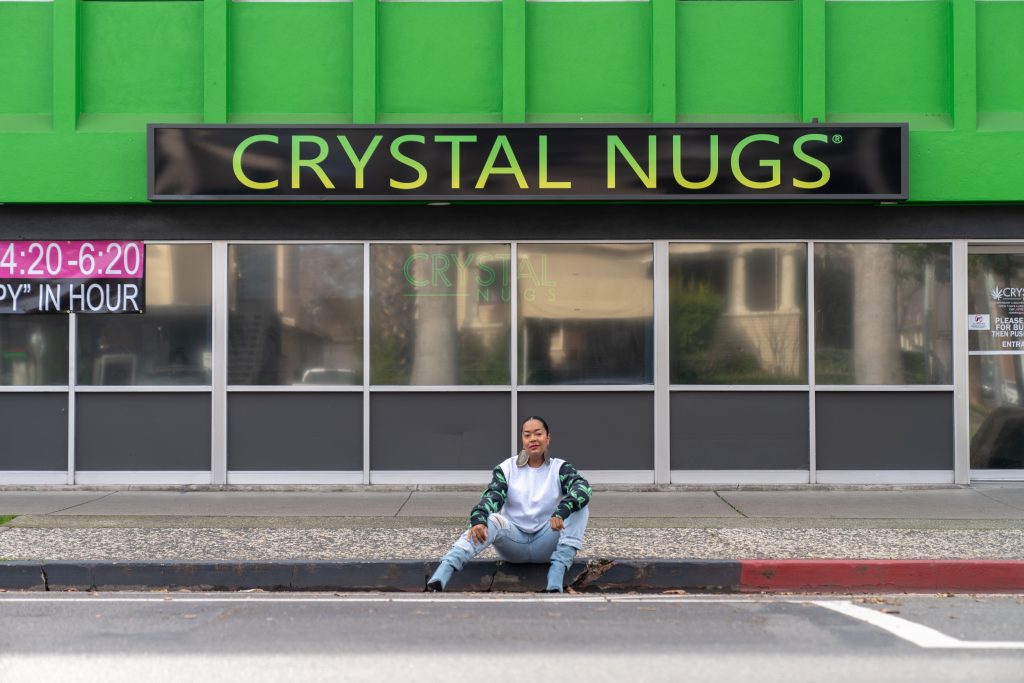By Ken Magri
Maisha Bahati stands proudly inside her new storefront. “We took so many risks,” she says. After four years of hard work and worry, Crystal Nugs cannabis delivery service opened a walk-in dispensary on J Street in Midtown Sacramento in November.
“This building had been boarded up for years. It was an eyesore,” Bahati says. “But we introduced ourselves, talked to people in the neighborhood, the Midtown Association, and got our conditional use permit.”
Crystal Nugs is Sacramento’s first Black and women-owned cannabis dispensary, and one of four new stores assisted by Sacramento’s Cannabis Opportunity and Racial Equity program.
“The CORE program helps entrepreneurs break into and operate in the regulated cannabis industry with support in everything from small-business education to advertising to networking opportunities and, of course, funding,” says Davina Smith, who leads the city’s Office of Cannabis Management.
Like other California cannabis equity programs, CORE was designed to help those adversely affected from law enforcement discrimination during America’s war on drugs. People qualify if they have past cannabis convictions or come from specific neighborhoods, designated by ZIP code.
In 2021, the Sacramento City Council awarded new cannabis dispensary licenses to 10 CORE participants after a neutral panel from outside the area evaluated 81 applications. Each new license holder has until April 2024 to open, or the license will be re-awarded to an alternate participant. To date, four dispensaries have opened.
Bahati and her partners Chris Lofton, Melinda Brown and Bryan Brown started in 2019 as a delivery service. “A few months in, I heard that the city was working on this program to help Black and brown people get into cannabis,” she says. Shortly after, Crystal Nugs became a CORE participant.
Bahati attended basic business classes administered by the Greater Sacramento Urban League and the Sacramento Asian Pacific Chamber of Commerce. She connected with other CORE participants while learning about financing, fee waivers and grant applications.
To avoid giving away part of their ownership to a bigger company, the four partners sold their homes and liquidated their assets. Aided by CORE grants and loans, and an additional loan from the cannabis-friendly Dama Business Solutions, Bahati says the partners finally accumulated the $400,000 they needed to proceed, along with $600,000 they raised themselves.
Khemia Manufacturing and Pocket Dispensary

Mindy Galloway, a Filipino-American who grew up in Sacramento’s Del Paso Heights neighborhood, was also an early CORE participant. She joined as a co-owner of the cannabis manufacturer Khemia, and quickly applied for a dispensary license. Last fall, Galloway opened The Pocket Dispensary on Florin Road in South Sacramento.
Because Khemia was already in operation, CORE designated it as an “incubator” business that can help other participants. “An incubator is a place where businesses can be created,” Galloway says. By sharing a manufacturing space, she has helped eight companies get started. “With a shared facility, you can earn that small amount of money and make your profit right away, and then scale up,” she says.
Funding is especially important at the beginning because, according to Galloway, the waiting time to get a conditional use permit and a city business operating permit can be as long as 18 months. “You’re paying rent on a building for up to a year and a half without even being able to operate,” says Galloway, regarding her dispensary. “That’s why the capital [from CORE] is so important.”
Another early CORE participant is Humble Root delivery service, owned by South Sacramentans Justin Jacinto, Chris Thao and Javier Hernandez. “We got involved at the very beginning when they first started the program,” said Hernandez.
Hernandez estimates that Humble Root has received $100,000 in CORE grants during its four years in operation, “to pay for things like professional accounting services and attorneys.” The partners had to document how the grant money was spent before applying for more funding.
Humble Root also wants a retail dispensary, but will have to wait to receive a license. “We applied and were listed outside of the top 10,” said Hernandez.
Evaluating the program

Because the city’s expertise in the cannabis industry was minimal, Bahati and Galloway said that CORE could only provide general business advice. While CORE participants interact with the city at regular stakeholder’s meetings, the two women mentioned having to solve cannabis-specific challenges, like banking and supply chain issues, themselves for this first run-through.
To better succeed, Bahati wants Sacramento to legalize on-site consumption, which would allow customers to enjoy products within a lounge setting at any dispensary. “If the city does move on that, it’s going to completely change the game,” she says. San Francisco has allowed it in selected dispensaries since 2022.
Last September, the city’s Law and Legislation committee began exploring “a pilot program of consumption lounges with consideration of consumption events to come later,” says Jennifer Singer, communications specialist for the city.
But the biggest problem participants cited was high cannabis taxes. The combination of a state excise tax along with local sales and business operating taxes (BOT) adversely affect the price point of legal cannabis products. After that, federal taxes skim from any remaining dispensary profits. “It’s not sustainable for our industry,” Galloway says. “Hopefully, in March the city is lowering their cannabis taxes.”
Singer confirms that the Law and Legislation committee is considering what to do with the cannabis BOT, and this March “may decide to advance the issue to the full City Council for discussion,” she says.
Singer also says that CORE recently partnered with the Los Rios Community College District for future educational and training opportunities. “The city is constantly working to improve the services it offers and feels the learnings from more experienced CORE members are invaluable,” she says.
Several participants cited networking as one of the most helpful benefits. “I am grateful that the CORE program provided me an opportunity to connect with others who are passionate about shaping an equitable cannabis industry in Sacramento,” says Rob Jackson, co-owner of Embarc dispensary in South Sacramento, and one of the first CORE license recipients to be up and running.
“What I love about the CORE participants is that we’re all friends,” Galloway says. “We work together, but everyone is still independently owned.”
Humble Root’s Hernandez agrees, saying that CORE’s help in making connections was almost as important as the funding. “They do a lot of events that bring us together, so getting to know the other equity operators in Sacramento really helps build the camaraderie. Rather than competitors, we call each other ‘co-petitors.’”
This story is part of the Solving Sacramento journalism collaborative. Solving Sacramento is supported by funding from the James Irvine Foundation and Solutions Journalism Network. Our partners include California Groundbreakers, Capital Public Radio, Outword, Russian America Media, Sacramento Business Journal, Sacramento News & Review, Sacramento Observer and Univision 19.


It is illegal to discriminate based on race. It is not a “Free Market” when government puts a thumb on the scale and creates so many barriers of regulation and discrimination. Cannabis should be as legal as tomatoes but there are powerful forces that want CONTROL of everything. These forces hate freedom, liberty and God.